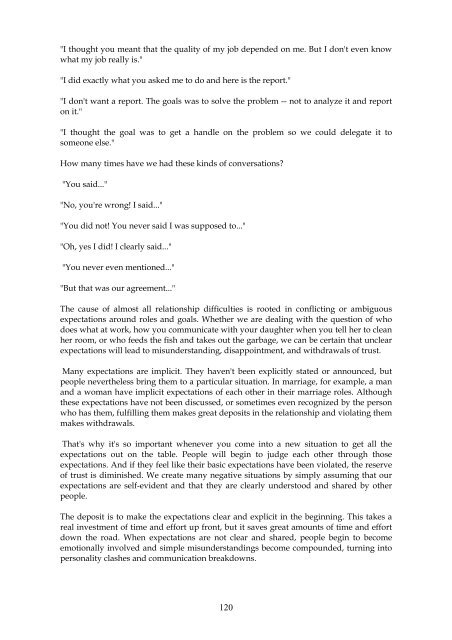Covey - The 7 habits of highly effective people
Create successful ePaper yourself
Turn your PDF publications into a flip-book with our unique Google optimized e-Paper software.
"I thought you meant that the quality <strong>of</strong> my job depended on me. But I don't even know<br />
what my job really is."<br />
"I did exactly what you asked me to do and here is the report."<br />
"I don't want a report. <strong>The</strong> goals was to solve the problem -- not to analyze it and report<br />
on it."<br />
"I thought the goal was to get a handle on the problem so we could delegate it to<br />
someone else."<br />
How many times have we had these kinds <strong>of</strong> conversations?<br />
"You said..."<br />
"No, you're wrong! I said..."<br />
"You did not! You never said I was supposed to..."<br />
"Oh, yes I did! I clearly said..."<br />
"You never even mentioned..."<br />
"But that was our agreement..."<br />
<strong>The</strong> cause <strong>of</strong> almost all relationship difficulties is rooted in conflicting or ambiguous<br />
expectations around roles and goals. Whether we are dealing with the question <strong>of</strong> who<br />
does what at work, how you communicate with your daughter when you tell her to clean<br />
her room, or who feeds the fish and takes out the garbage, we can be certain that unclear<br />
expectations will lead to misunderstanding, disappointment, and withdrawals <strong>of</strong> trust.<br />
Many expectations are implicit. <strong>The</strong>y haven't been explicitly stated or announced, but<br />
<strong>people</strong> nevertheless bring them to a particular situation. In marriage, for example, a man<br />
and a woman have implicit expectations <strong>of</strong> each other in their marriage roles. Although<br />
these expectations have not been discussed, or sometimes even recognized by the person<br />
who has them, fulfilling them makes great deposits in the relationship and violating them<br />
makes withdrawals.<br />
That's why it's so important whenever you come into a new situation to get all the<br />
expectations out on the table. People will begin to judge each other through those<br />
expectations. And if they feel like their basic expectations have been violated, the reserve<br />
<strong>of</strong> trust is diminished. We create many negative situations by simply assuming that our<br />
expectations are self-evident and that they are clearly understood and shared by other<br />
<strong>people</strong>.<br />
<strong>The</strong> deposit is to make the expectations clear and explicit in the beginning. This takes a<br />
real investment <strong>of</strong> time and effort up front, but it saves great amounts <strong>of</strong> time and effort<br />
down the road. When expectations are not clear and shared, <strong>people</strong> begin to become<br />
emotionally involved and simple misunderstandings become compounded, turning into<br />
personality clashes and communication breakdowns.<br />
120


